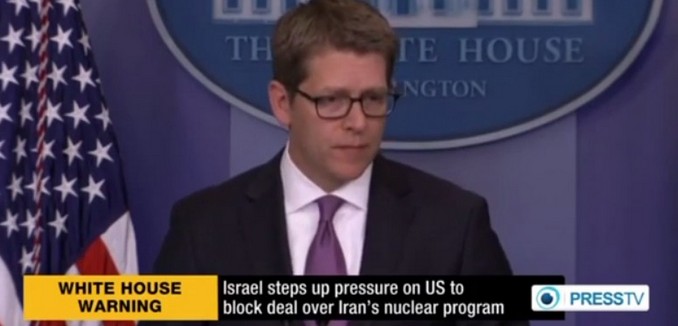Secretary of State John Kerry traveled today to the Hill to pressure Senators to delay placing additional financial restrictions on Ira, after weekend’s failed negotiations in Geneva had triggered analysis suggesting that Tehran was not yet prepared to make meaningful concessions on its nuclear program. Calls quickly grew for Congress to pass new sanctions that would ratchet up the kind of pressure that the administration had elsewhere insisted was responsible for bringing the Iranians to the table in the first place.
The legislative battle threatens to have political implications, with the White House lining up opposite some Congressional Democrats who have already supported strong sanctions. Statements made yesterday by White House Press Secretary Jay Carney, and conveyed by the LA Times, have been taken in some corners as impolitic:
The White House warned Congress on Tuesday that slapping new sanctions on Iran could sink international negotiations to curb Tehran’s nuclear program and send America on a “march to war.” In the latest ratcheting up of the administration’s effort to stop Congress from adding to existing sanctions, White House Press Secretary Jay Carney said Americans are in a deeply antiwar mood and implied that voters might turn their anger on lawmakers if a failure of diplomacy leads to military action to prevent Iran from getting the bomb. “The American people do not want a march to war,” Carney told reporters.
Iranian state media picked up and rebroadcast Carney’s statements both in print and on television.
It is not known whether any of the 178 House Democrats who voted in July to increase sanctions on Iran were briefed beforehand about the White House stance. Politico had already reported yesterday on bipartisan efforts in the House – spearheaded by Peter Roskam (IL) and Michael McCaul (TX) on the Republican side and Brad Sherman (CA) and Grace Meng (NY) on the Democratic side – calling on Senate leaders to consider ‘an uptick in sanctions’. The letter evaluated administration arguments insisting that new sanctions would derail negotiations and dismissed them:
“We believe that as the United States negotiates with the P5+1 group and Tehran, it is critical to maximize U.S. leverage against the Iranian regime,” the letter reads. “The possibility of tighter sanctions will enhance our leverage in the nuclear standoff between Iran’s Supreme Leader and the international community. Despite Hassan Rouhani’s attempt to portray Iran’s government in a new light, the objective of the Iranian regime remains the same: the pursuit of a nuclear weapons capability.”
The Hill today reported that bipartisan efforts in the House had advanced beyond waiting for the Senate to pass new sanctions legislation, and that lawmakers were now looking to circumscribing the ability of the administration to make concessions in future negotiations.
Some former Democratic lawmakers also went public with unease over last week’s offer to the Iranians, calling for new pressure until a final deal is achieved. Former Nevada Congresswoman Shelley Berkley, who is also a member of the Board of Directors of The Israel Project, took to the pages of the Las Vegas Review Journal to make the point:
By all reliable accounts, and despite repeated denials, the United States is actively pursuing a catastrophic agreement with Iran, one that would facilitate the nuclearization of one of the most extreme, violent and anti-American tyrannies on Earth, with consequences that will be regretted for generations… sanctions should be eased only in exchange for the Iranians’ unequivocally and irreversibly abandoning their nuclear ambitions. Now is the time to increase the pressure, not withdraw it.
A bad deal, we have been told, is worse than no deal at all. The emerging agreement, however, is much worse than a bad deal. It rewards the Iranians with billions of dollars while enabling them to build the nuclear weapon they so desperately want — all under the veil of detente. Signing it would mean taking a big step toward the unthinkable.
[Photo: PressTV Videos / YouTube]




